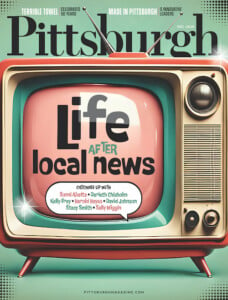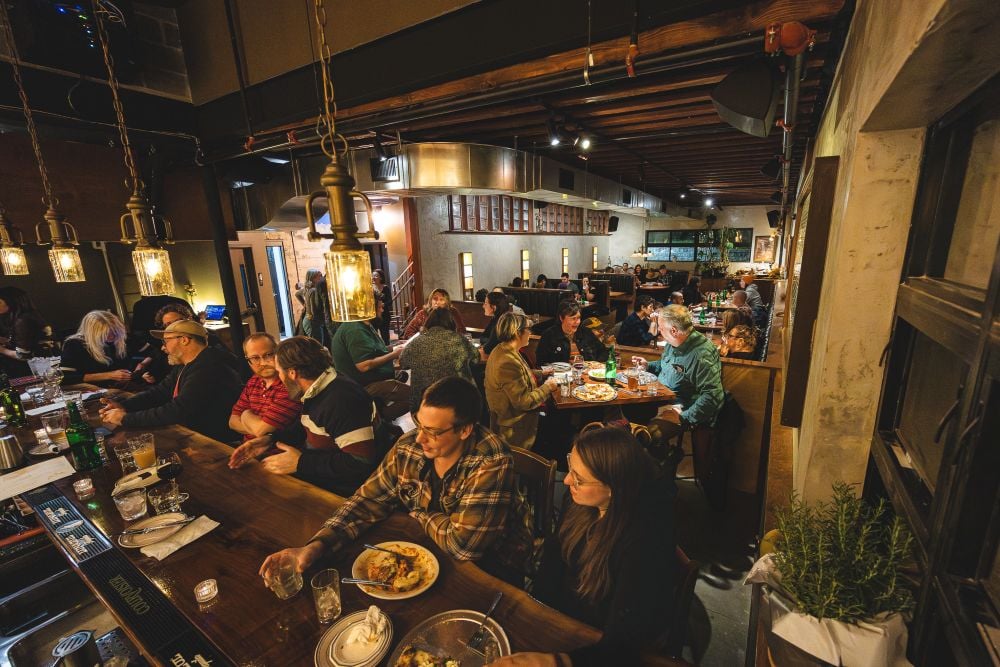5 Local Companies Making Their Mark on Pittsburgh — and Beyond
All credit Pittsburgh’s spirit of innovation and its accessibility for their success. Said one: “Pittsburgh is the most supportive place in the world; everyone wants you to succeed.”

FROM TOP LEFT, CLOCKWISE: STUDEBAKER METALS, PHOTO BY DANA BROEKER; ASTROBOTIC TECHNOLOGY, PHOTO COURTESY ASTROBOTIC TECHNOLOGY; SUBTL BEAUTY, PHOTO COURTESY SUBTL BEAUTY; NEAR EARTH AUTONOMY, PHOTO COURTESY NEAR EARTH AUTONOMY; TB FRAGRANCES, PHOTO COURTESY TB FRAGRANCES
One company is trying to change Pittsburghers’ views on the type of industry that could thrive here and move the economy beyond the city’s traditional manufacturing ventures like steel.
Another is on the cutting edge of drone technology that could become an invaluable delivery system across the world. Another sprung up to further the creative endeavors of a young couple whose products are in such demand that they’ve had to expand their shop multiple times.
Astrobotic Technology
It may be uncommon to ponder Pittsburgh’s place in the Space Race, but John Thornton says it’s time for locals to rethink what industries define this city and its economy.
“We are Pittsburgh’s local space company,” he says. “Space in Pittsburgh is not a regular thing, and we want to change that.”
As CEO of Astrobotic Technology, Thornton is leading the charge.
Astrobotic’s roots are at Carnegie Mellon University, where robotics legend Red Whittaker and his CMU associates began to think about Pittsburgh as a space hub in 2007 and founded the lunar logistics company.
“Everything was telling us to move,” says Thornton, who was chief engineer of Astrobotic at the time. “Financially, it would have been better in another city.” The company was offered millions of dollars to move to other states but stuck it out. “We wanted to do it in Pittsburgh. We committed to it,” he says. “We want to be a part of building the region, as well as building the space economy in this state.”
While great progress has been made since its founding, Astrobotic has experienced a year of highs and lows in 2024. They were thrilled over the successful launch on Jan. 8 of its first mission to the moon — and NASA’s first attempt to return to the moon in 50 years. However, just hours after launch, the Peregrine lunar lander experienced a problem with a valve in its propulsion system. While it did operate in space for 10 days and 14 hours and achieved several technological and scientific objectives, it never reached the moon.
Astrobotic had high hopes for its Griffin lander, which was supposed to carry the VIPER rover to the moon this November. But NASA in July scrapped the VIPER program because of cost overruns. NASA is continuing with the Griffin lunar lander, part of its Commercial Lunar Payload Services initiative under the Artemis campaign, which seeks to create a permanent presence on the moon. Griffin lunar lander is poised to head to the moon before the end of 2025.
Thornton says it’s crucial for local investors to realize this is the future for this former Rust Belt city — and support that effort. “Look at all the investment we put into our students and universities, only for them to take their talent and build profitable businesses on the West Coast,” he says. Investment in technological industries is needed to retain that local talent — as well as attract new talent.
Astrobotic also created the Moonshot Museum, which opened at its Chateau headquarters in October 2022 and is run by the Astrobotic Foundation. Founders say it is Pennsylvania’s first space museum and the only one in the world that focuses exclusively on career and community readiness for the space industry.
From only three employees in 2009 to 275 today, Astrobotic’s upward trajectory mirrors that of the rockets it’s helping to launch. They’ve secured more than $500 million in NASA contracts and have cemented Pittsburgh’s crucial role in the Artemis space campaign.
“It’s kind of a big deal,” says Thornton. “We are leading the nation back to the moon for the first time since Apollo. If Pittsburgh can do this, what else can we do? There is no limit. We are not an old steel town anymore.” —MS
Studebaker Metals
Sometimes, you just need a change of pace. That’s where Alyssa Catalano and Michael Studebaker found themselves in 2013 — they were both in creative fields but were looking for their own endeavor. “We asked ourselves, ‘What do we want to be doing?’” says Catalano.
Studebaker showed Catalano a keyholder he had forged, using an anvil and hammer that were 170 years old. He had experience with the timeless nature of metalworking, its ties to Pittsburgh, and the things he could create. This was how he wanted to spend his time.
Catalano, who has a background in fashion purchasing, knew her partner’s idea was unique — and marketable. “This is the kind of soul and story that you can’t make up,” she says. “Big soulless companies search for something this romantic to talk about.”
That’s when Studebaker Metals was born. While he worked on a catalog of handmade designs, she built a website — and some hype. She recalls that one of their first pop-up shops was at a coffee shop on Smallman Street in the Strip District. “We set up a two-person table in the corner and just began to introduce ourselves to folks,” she recalls. “And now, 11 years later, our shop is on Smallman.”
The couple admits their first big order was a bit of a Hail Mary, as they worked furiously from their basement to produce thousands of pieces of jewelry. Somehow, they did it. “We pulled it off, we got paid, and that is the money we used to launch the business,” says Catalano. It’s been grassroots since, with no outside investors — the pair says they want to retain creative control over their brand.
Once they outgrew that basement, the company worked out of shops in Wilkinsburg and Braddock. They had to rent additional space nearby as the business grew but dreamed of housing all of Studebaker Metals, from production to sales, under one roof.
This past summer the couple welcomed the public into their new home on Smallman Street. A floor-to-ceiling glass wall allows shoppers to see the metalworking process in action while browsing the wares. Tours are popular, and the additional space means the couple has the opportunity to showcase other local artists, too. “We want to offer items that aren’t available anywhere else in Pittsburgh,” says Catalano.
After all, they see the story of Studebaker Metals as a classic yinzer tale. Their shop was once the home of Crucible Steel, and they stamp each piece with “PGH USA.” While the process is different from creating steel I-beams, it’s all metalworking at its core.
“What we have here today would be impossible anywhere else,” says Catalano. “Pittsburgh is the most supportive place in the world; everyone wants you to succeed. This place was our manifest destiny and the only place we could have done it.” —MS
TB Fragrances
Pittsburgh is the perfect place to position a business that often needs to hit the road, discovered Valencia Talbert. As the founder of TB Fragrances, a contemporary home fragrance line based in Sharpsburg, she says this city’s central location is one of the main reasons her business has flourished. Traveling to trade shows in New York City and artisan markets in Chicago, Nashville and Philadelphia is a breeze. But on its own, the city that launched her dream is an integral part of the business’ story.
“This is where we started the business and where it is known. We have such a good sense of community,” she says. “That is one of the driving forces for us staying here.”
Talbert moved from Philadelphia to Pittsburgh in 2012 for college but stayed for love. Her husband, Raymon, a native Pittsburgher, has played a role in TB Fragrances since its inception. It originally launched as a jewelry company in 2018 called Maverick Objects. Talbert says that fragrances began to take off — so she leaned in; geode candleholders and incense have made up the bulk of their sales since the company’s inception.
The company launched as Tal & Bert before the pandemic with $150. It got funding in November 2023 from Allegheny County Economic Development, which allowed the company to expand. Talbert recently renamed the company TB Fragrances.
She says that beyond that initial influx of support, she has not yet been willing to bring in outside capital and lose their hands-on approach. “We do everything in-house, and a lot of investors will push to change that,” she says. Right now she controls each step of design and production closely. “The handmade access is still a draw to those that have supported us and our loyal followers.”
The bulk of TB Fragrances sales come from online marketing and wholesale partnerships, but Talbert loves how her family business still functions within its home city. As a fan of the local beer scene, she’s hosted “craft and crafts” nights at breweries as well as at the Sharpsburg storefront, which operates on a seasonal schedule. “I wanted to make a way for adults to create,” says Talbert. “Adults need a creative outlet, too.”
As for her own creative outlet? Talbert could not be more thrilled at how quickly her business has grown. She’s looking toward expanding the company’s fragrance lines in the near future, but customers will have to keep an eye out for news on those exciting changes. “We are definitely looking to grow.” —MS
Near Earth Autonomy
In 2014, Near Earth Autonomy had to test its large, self-piloting helicopter in Quantico, Virginia, under unusually heavy snowfall for February. The team feared that, after months and months of intense preparation, the flight wouldn’t be successful.
“It was enveloped in this whiteout, but it came and it landed perfectly,” says Sanjiv Singh, CEO of Near Earth Autonomy. “And so, the people we’re with said, ‘Oh, OK, when are the autonomous flights gonna start?’ And we said, ‘No, that was autonomous.’ And they said, ‘No, no, that was autonomous?’”
This aerospace and robotics company based in Point Breeze finds itself in 2024 at the cutting edge of drone technology, supplying the private and public sector with drones from a few feet in size to full-size helicopters, ensuring safe and efficient flight operations.
The company specializes in logistics, focusing on transporting goods from one place to another. This includes delivering materials such as bandages, food and other supplies to areas that may be ravaged by war or dangerous conditions unsuitable for human pilots. Last year, The Association For Uncrewed Vehicle Systems recognized the company as a finalist for the “Xcellence in Mission — Humanitarian Award” for its technology that autonomously delivers blood and medical supplies to service members involved in combat or military operations.
Near Earth Autonomy began in October 2012, co-founded by Singh and three other members of Carnegie Mellon University’s robotics faculty. Singh obtained a robotics Ph.D. from CMU in the mid-’90s and taught there for many years before starting Near Earth Autonomy and becoming its CEO. The company’s partners include Airbus, Boeing, Embraer and every branch of the U.S. military.
Singh views the company’s 12-year history in three phases: the first focused on “the art of the possible,” followed by a phase centered on “the art of the practical” and now a focus on commercialization. In essence, the company spent five years exploring what could be done, another five years determining how to make it work and is now focused on scaling it reliably.
The Naval Air Systems Command announced in July that it had selected Near Earth Autonomy to lead a team working with the Marines that would entail developing uncrewed helicopters capable of transporting up to 3,000 pounds of materials within a 200-mile radius.
Singh and his team have spent a lot of time thinking about the future of automated robotic technology. It’s common for people to get caught up in near-science-fiction-level fantasizing of a world in which robots fly everyone’s mail to their doorstep or make other deliveries. For Singh, someone who has worked at the upper echelons of this technology every day for more than a decade, it’s a gradual growth with lots of experimenting and hard work along the way.
“When the hype settles, there is a slow climb in productivity … it takes many years for there to be products that are good enough,” Singh says. —MP
Subtl Beauty
Rachel Reid is the first to admit that Pittsburgh is not known as a beauty hub — but she chose to launch her company, Subtl Beauty, here anyway.
It was a smart move. The brand, which features stackable makeup products for customers on the go, hit the market in 2018 and has been gaining popularity since. “The products are sold online,” says Reid. “People don’t even realize we are from Pittsburgh.”
The idea for the compact, interchangeable stacks came to Reid while she fumbled through her makeup bag one harried day. “It was about flexibility, really. I began to talk to people about how they were currently solving this problem — if it was a problem for them.”
She quickly found out that her issue was universal and began brainstorming. Functional, high-quality products are the foundation of Subtl’s brand, but fun and approachable marketing drives the much-deserved hype.
Reid’s background is in e-commerce, but she says the support she found in the local startup community was essential. She learned quickly that she had much in common with other founders, even if their products were very different. From business chats at one of her local favorite eateries, Margaux in East Liberty, to an initial infusion of cash by local investors, this city helped build her brand. The company’s most recent infusion of $5 million came from a New York-based equity firm, but the brand’s bootstrapping roots are all homegrown.
Relocating to Pittsburgh from New Zealand at the age of 15 for what was supposed to be a one-year stint, she’s now come to call this city home. “It might be more advantageous to move,” she says. Many of their customers are in larger cities, but advances in technology mean she’s able to keep Subtl local while leveraging resources across the country. “Pittsburgh is a small community. I love my lifestyle here, my friends. My experience in America is Pittsburgh.” — MS


















